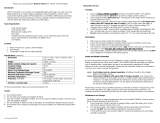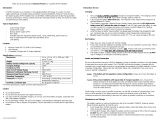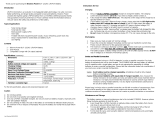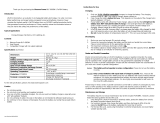Page is loading ...

Thank you for purchasing the Bioenno Power BLF-1230LB LiFePO4 Battery
Introduction
LiFePO4 chemistry is an evolution in rechargeable battery technology. It is safer, non-toxic,
higher performing, and longer lasting compared to lead-acid batteries. Bioenno Power
provides the highest quality LiFePO4 battery from our ISO9001 certified production facility
that guarantees maximum performance. Please carefully review the information below as
they are vital to the safety and performance of the battery.
Typical Applications
- Energy Storage, Electronics, Ham Radio, LED Lights, E-Bikes, E-Scooters, etc.
Contents
1 - Bioenno Power BLF-1230LB LiFePO4 Battery
1 - User Manual
1 - Compatible Charger with 6A output (optional)
Specifications (summary)
Dimensions
7.0 in. x 7.0 in. x 5.0 in. (178 mm x 178
mm x 127 mm)
Weight
8.8 lbs. (4 kg.)
Battery nominal voltage and capacity
12V, 30Ah
Charging Voltage
14.6V
Charging Current
6A
Open Circuit Voltage Range
10-14.6VDC
Maximum Continuous Discharge Current
30A
Maximum Peak Pulse Current
60A (5 sec.)
Operating Temperature
- 10°C to 60°C
Protection: PCM/BMS
Overcharge, overdischarge, overcurrent,
temperature, balancing
Terminal / connector type
Screw Terminal
For the full specification, please visit www.bioennopower.com
Caution
● Do not disassemble.
● Do not short circuit positive and negative terminals.
● Use only LiFePO4 compatible chargers. Do not use Lead Acid battery chargers, especially ones
with “anti-sulfation” features
● Do not submerge in water, the seal on the battery is not intended to withstand water pressure
● Do not throw in fire or dispose of improperly. Recycle the battery at a facility that accepts lithium
battery
● BEFORE DISCHARGE CONFIRM TERMINAL SCREWS ARE WRENCH TIGHTENED TO ENSURE PROPER
CONTACT IS MADE
Last Revised 04/23/2019
Instructions for Use
Charging
1. Only use 14.6V, LiFePO4 compatible chargers to charge the battery. The charging current
should be ~6A. If you need a charger, please contact us.
2. Fully charge the battery before first use. This depends on the output of the charger but is
typically between 3-5 hours.
3. If your battery came with a Bioenno Power charger, please note that the LED light on the
battery does NOT indicate the state of charge. A red LED light means the battery is under
constant current (CC) charging and green LED means constant voltage (CV) charging.
Always charge for at least 5 hours to ensure full capacity.
4. LiFePO4 does not suffer “memory effect” so please keep the battery fully charged for daily
use. Cell balancing only occurs when the battery is fully charged (top-end balancing).
5. Do not charge the battery in temperatures below 0°C. This can cause damage to the cells.
Discharging
1. Make sure your load accepts 12V nominal voltage.
2. Ensure the connection between the battery and the load can handle the current draw.
Please consult references for the appropriate wire type.
3. The maximum continuous discharge current is 30A.
4. The battery outputs a steady voltage around 12.8V until very little capacity remain, do NOT
rely on voltage as an indicator of remaining capacity.
Series and Parallel Connection
We do not recommend using our LiFePO4 batteries in series or parallel connection if a single battery
of equivalent size can be used instead. The PCM/BMS built into each battery is intended only for
operation with a single battery and we do not guarantee the operability of multiple batteries in series
or parallel configuration. Please take the information below into consideration if you must use a
series or parallel configuration.
Series: This battery will not operate in series configuration. Please do not use the battery in
series.
Parallel: Only connect batteries with equal state of charge in parallel. Also, measure the
internal resistance of each battery and only use batteries with closely matched internal
resistance. It is highly recommended that resistors be used to achieve equal internal
resistance among multiple batteries. It is also highly recommended to add fuse(s) to the
circuit for safety reasons.
Please keep in mind a series or parallel connection can fail with a number of consequences, from
early cut off to possibly a fire. Always exercise caution and observe closely at all times. The
customer assumes all responsibility in the event of a series or parallel connection or connections.
Maintenance and Storage
The battery requires no manual maintenance due to the included PCM/BMS. However, please
follow the below guideline for best life cycle.
1. Even though the LiFePO4 chemistry is relatively stable, protect the battery from shocks and
drops to prevent internal short circuit.
2. For long term storage, fully charge the battery and then discharge to 50% of the full capacity.
Do NOT leave the battery unattended for more than 6 months.
3. For the best life cycle, avoid using the battery in extreme temperatures and avoid highly
variable pulsing loads.

Troubleshooting
Since the battery can be used in many different configurations and equipment, we cannot provide
a general troubleshooting guide. Please contact us so a technician can provide you with
individualized support.
FAQ
Q. The terminals/connectors on the battery do not fit my application, what do I do?
A. You can change the terminal/connector to whatever type you need without voiding the warranty
so long as you do not open the battery or modify the casing.
Q. I have a universal lead acid charger with high charging current, can I use it instead?
A. Not recommended. Lead acid battery charges at 2.30V to 2.45V per cell whereas LiFePO4
needs 3.60V per cell. Your battery would be undercharged so you won’t get full capacity nor
will balancing be triggered, both of which are not desired. Furthermore, the floating charge of the
lead acid charger is not expected by the battery and can cause problems.
Q. How come the battery stops working a few seconds after a high current draw?
A. Make sure the load is not exceeding the rated continuous output current else the PCM shuts off
the battery after 2 sec. To reset, disconnect the load and attach the charger for a few seconds.
If you need more current output, please contact us for an exchange or a custom solution.
Q. Can I buy another of the same LiFePO4 battery to double the voltage or capacity?
A. Not recommended. Refer to the series and parallel connection section. You should always get a
single battery that meets your voltage and capacity requirements to avoid problems.
Q. I need more help with the battery I bought?
A. Please contact us using the information below.
Contact Us
Mail: Bioenno Power E-mail: sale@bioennopower.com
3657 W. McFadden Ave. Phone: +1 888 336-7864
Santa Ana, California 92704
Warranty
Please see the included warranty pamphlet for warranty information. You can also check www.bioennopower.com
for more information.
Bioenno Power
BLF-1230LB
LiFePO4 Battery
User Manual
/











